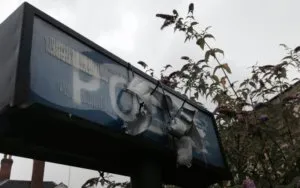New government plans that would protect some disabled people from the risk of fire in residential buildings do not go far enough, and even suggest that disabled residents might have to pay for measures to keep them safe, say campaigners.
The Home Office this week launched a consultation on how to implement recommendations made at the end of the first phase of the Grenfell Tower Inquiry in October 2019.
The inquiry concluded that there were no plans in place for evacuating Grenfell Tower, which contributed to the loss of 72 lives in the fire, on 14 June 2017, including many disabled residents.
Among its recommendations, the inquiry said that owners and managers of high-rise residential buildings should be legally required to prepare personal emergency evacuation plans (PEEPs) for all residents who may find it difficult to “self-evacuate”, and to keep up-to-date information about these residents and their PEEPs in an on-site information box.
The new consultation, which closes on 19 July, asks for views on the government’s draft proposals to implement these two recommendations.
It comes only days after disabled campaigners and allies shared an open statement with the home secretary, Priti Patel, and the housing, communities and local government secretary, Robert Jenrick, calling for long-overdue action on the recommendations.
The Grenfell inquiry did not define a high-rise residential building, but the government has said that its proposed new safety rules should apply only to those buildings at least 18 metres in height or having at least seven storeys.
Disabled campaigners and their allies say this will leave many disabled people living in multi-storey residential buildings below this height unable to benefit from the PEEPs proposals and therefore left at risk.
Sarah Rennie, co-founder of Claddag, a leaseholder disability action group, said: “Everyone should be able to evacuate a building in an emergency.
“We do not accept the proposal that only disabled people in buildings above 18 metres should be allowed a plan.
“No disability-specific research is offered to support the distinction.”
Rennie said the government’s consultation document also holds open the possibility that disabled residents will be charged for any measures that need to be introduced to allow them to evacuate in an emergency, according to their PEEP.
She points to a section in the document which states: “Putting a PEEP in place for an individual should not of itself give rise to a requirement that any person has to incur a cost or bill (but it cannot be excluded that this is a possibility).”
Rennie also warns that the government does not explicitly state that disabled residents cannot be charged to have a PEEP drawn up.
She said: “This wholly contradicts the principle that disabled people must not be charged for reasonable adjustments.
“What’s more, the consultation does not propose a central fund for the costs of evacuation aids, either.
“Many of us opted to live in buildings we were told were safe, but the building safety crisis is revealing that we are living in very dangerous buildings.
“It should not fall on us or our neighbours via a service charge to foot the bill for our evacuation costs and that must be made clear. It’s a recipe for disability hate crime.”
There are also concerns over the government’s proposals to require disabled residents to “self-identify” as unable to self-evacuate, with the fear that some landlords might not do anything to encourage residents to apply for a PEEP.
The government document says there will have to be “meaningful and sustained engagement with all residents whereby the [owner or manager] proactively encourages residents to come forward if they consider they may need a PEEP”.
But Rennie said: “How are these processes going to be transparent and accessible?
“Without a clear duty to reach out to residents, this encourages landlords to stay quiet so as not to invite requests for evacuation plans.”
A spokesperson for the Grenfell Next of Kin support group, which represents the next of kin of 31 of the 72 people who died, said in a statement: “Nearly half the disabled residents in the Tower were killed. Some of them our mothers and fathers, brothers and sisters and children.
“Alongside them other members of the family also perished as they stayed together in those horrific terrifying conditions.
“This is the reality of not having PEEPs or any attention paid to disabled residents and in high-rise buildings and especially so with social housing tenants who are often the most marginalised.
“We are determined this does not happen again and necessary changes are made to avoid the consequences of such discrimination.”
Picture: Close-up of Grenfell Tower with banners in June 2018 (c) by Carcharoth is licensed under Creative CommonsAttribution-Share Alike 4.0 International
A note from the editor:
Please consider making a voluntary financial contribution to support the work of DNS and allow it to continue producing independent, carefully-researched news stories that focus on the lives and rights of disabled people and their user-led organisations.
Please do not contribute if you cannot afford to do so, and please note that DNS is not a charity. It is run and owned by disabled journalist John Pring and has been from its launch in April 2009.
Thank you for anything you can do to support the work of DNS…

 MPs are told accessible housing is at breaking point… and they are partly to blame
MPs are told accessible housing is at breaking point… and they are partly to blame Protesters say ‘obscene’ profits from ‘inhuman’ asylum housing conditions must end
Protesters say ‘obscene’ profits from ‘inhuman’ asylum housing conditions must end ‘Shocking’ disability hate crime figures, a year on from police and CPS promises
‘Shocking’ disability hate crime figures, a year on from police and CPS promises